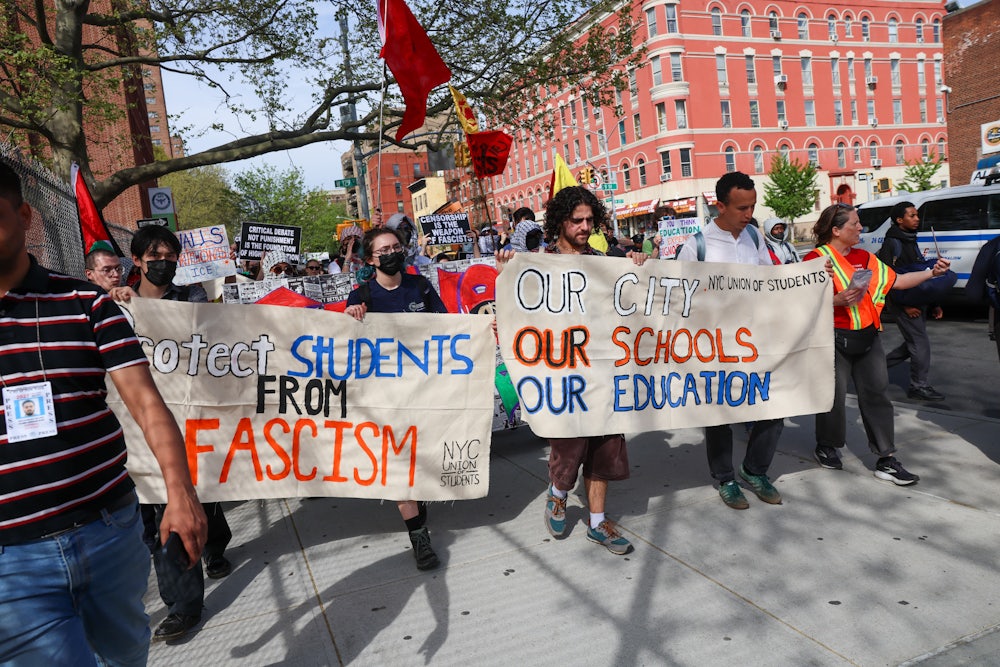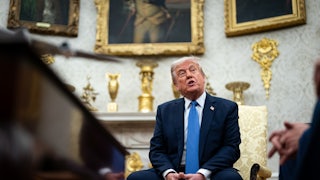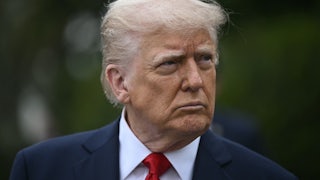As the GOP escalates its crackdown on student protesters in the wake of the Gaza solidarity movement, a familiar pattern is reasserting itself in American politics. Under the guise of fighting antisemitism, Republicans are resurrecting an old ideological project. The goal is twofold: to restrict who gets education, and to control what they learn once they get there. What’s unfolding is not just a moral panic over campus protests but a structural power grab: The ultimate aim is not merely to silence dissent but to fundamentally remake higher education.
In his 1966 gubernatorial campaign, Ronald Reagan weaponized public frustration with campus activism to launch a broader attack on California’s university system. He campaigned on the promise to “clean up the mess at Berkeley,” casting student demonstrators as Communists, beatniks, sexual deviants, and a threat to the American way of life. He strongly opposed affirmative action, calling it “reverse discrimination,” and believed that education should service the economy, not democracy.
Once in office, Reagan slashed funding for California’s public universities and pushed to end free college education altogether. “The state should not subsidize intellectual curiosity,” he said at the time, crystallizing a vision of education as a privilege, not a public good, that has subsequently been adopted by much of the American right. But Reagan’s agenda wasn’t just about restoring order on campus. It was a strategy to restrict access to education and, with it, suppress dissent.
His contempt for working-class intellectual empowerment was made explicit by his education adviser Roger A. Freeman in 1970. “We are in danger of producing an educated proletariat,” Freeman said. “That’s dynamite! We have to be selective on who we allow [to go to college]. If not, we will have a large number of highly trained and unemployed people.” Education can be radicalizing, in other words, and shouldn’t be available to the working masses.
In 1969, Reagan and the University of California Regents granted themselves the power to review all permanent faculty appointments. That same year, under pressure from Reagan, the UCLA administration moved to fire the radical academic and activist Angela Davis from her position in the Philosophy Department, citing her membership in the Communist Party. Reagan criticized the humanities and the emerging fields of gender and ethnic studies. He promoted the idea that public universities should focus more on technical skills and job training. He cut federal spending for the arts and humanities by millions of dollars, while directing funds to STEM programs to bolster “economic and military strength.” On the presidential campaign trail in 1980, he promised to abolish the newly created Department of Education, and in the final days of his presidency, in 1988, praised an educational curriculum that celebrated “the glory of Western civilization.”
The crisis is not simply about campus unrest. It is about who controls knowledge, who defines the boundaries of acceptable discourse, and who gets to access the means of intellectual and political empowerment. Donald Trump is reviving this very playbook, albeit with updated language and a different set of enemies. Trump, similarly, has called universities “indoctrination centers” and vowed to “vanquish the radicals and take back our campuses.” This effort is not a break from the past but its logical continuation.
In recent months, Trump has: signed an executive order to dismantle the Department of Education, suspended student loan repayment programs and $400 million in funding to Columbia University, and threatened Harvard University’s tax-exempt status after freezing over $2 billion in federal funds. Dozens of universities now face federal investigations as part of Trump’s anti–diversity, equity, and inclusion campaign. Perhaps most disturbingly, he has encouraged U.S. Immigration and Customs Enforcement to target international students involved in Gaza solidarity protests for deportation; several are currently being held in a processing facility in Louisiana.
Trump has taken Reagan’s playbook and pushed it even further, asserting direct control over the university curriculum in unprecedented ways. In March, the White House pressured Columbia to place its Department of Middle Eastern, South Asian, and African Studies under academic receivership—a rare and dramatic move that strips faculty of their governance and installs an external chair. In response, Columbia appointed a new senior vice provost to oversee a sweeping review of the department’s programs, including the Center for Palestine Studies and the Institute for Israel and Jewish Studies. The university also announced a ban on face masks and protests inside academic buildings, and pledged to reevaluate its admissions policies. Taken together, these actions have been widely seen as a chilling assault on academic freedom and institutional self-governance that threatens to undermine the character of American higher education itself.
At Harvard, the Trump administration has escalated even further, demanding that the university audit “viewpoint diversity” across students, faculty, and staff and scrutinize departments and programs deemed to “fuel antisemitic harassment” or suffer from “ideological capture.” The White House has also issued guidance on which student organizations should be permitted to operate on campus—an extraordinary level of federal interference in university life.
At the same time, institutions like Hillsdale College, a Christian, conservative school in Michigan, and the (currently unaccredited) University of Austin have swooped in to fill a supposed gap in the ideological spectrum. Palantir Technologies too has encouraged high schoolers and recent graduates to “skip the debt” and “indoctrination” and sign up for its “Meritocracy Fellowship”—a four-month paid internship that it’s dubbed the Palantir degree. Together, these efforts are early steps toward the formation of an “alternative” university system, designed to circumvent traditional education entirely.
The current right-wing obsession with Gaza protests provides a convenient justification to accelerate this project. By portraying student protesters as unhinged antisemitic extremists, Trump has provided himself with blanket cover to delegitimize universities as a whole for “failing to protect” Jewish students and has painted campuses as lawless madhouses. The university administrators who demonized their students for protesting a genocide laid the groundwork for his campaign—as did a number of high-profile Democrats, including former President Joe Biden and Chuck Schumer, the current Senate minority leader.
The wave of arrests, expulsions, and legislative and financial threats is certainly about punishing those who contradict U.S. foreign policy, but it’s also about reasserting top-down control over institutions that have historically served as incubators for social movements, critical thinking, and progressive coalitions.
This fits neatly with the broader trajectory of the Republican Party, which has been gaining strength with voters without college degrees for many years now. Rather than invest in students or address the nation’s growing educational divide, the GOP has sought the opposite strategy. After all, if college graduates lean Democratic, perhaps it isn’t a bad thing, in the right’s imagination, if fewer people go. It certainly benefits Trump allies like Elon Musk who want cheap, unskilled labor for their imaginary domestic manufacturing boom.
This logic often isn’t spoken out loud, but it animates much of the GOP’s educational policies, from attacking student loan forgiveness to cutting off funding. These attacks function as a mass disinformation campaign to instill distrust in our institutions and steer young people away from attending. Roughly a third of Americans express a great deal of confidence in higher education, down from nearly 60 percent a decade ago, according to a 2024 Gallup poll. Of those who lack confidence, 41 percent mention schools as being “too liberal” or trying to “brainwash” students, while fewer of those who express doubt cite rising costs, educational quality, and not teaching relevant skills. These figures are likely to get worse with Trump’s ongoing standoff.
Unlike Reagan, Trump isn’t particularly focused on public colleges—he’s going after elite private institutions like Harvard, Columbia, and Yale. His fixation on the Ivy League reveals the class dimension of this campaign. It’s not just about silencing left-wing thought but about reasserting control over the gatekeeping institutions that shape future elites. It’s the predictable outcome of a decades-long project to restore the “good old days” when education served as a gatekeeper of social privilege—when access to elite institutions was restricted to a narrow, ideologically aligned elite. In this vision, education is not a ladder for upward mobility but a fortress of cultural and class reproduction, policed from above.
The stakes are huge. If Republicans succeed, the result won’t just be fewer protests. There will be a higher education system that is poorer, narrower, and more obedient—one that serves authoritarianism instead of challenging it.




